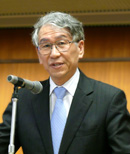DG's Corner
Obituary: Dr. Tetsuji Nishikawa
22 Dec 2010

Atsuto Suzuki
Director General
Dr. Tetsuji Nishikawa, an outstanding leader who advanced accelerator science and engineering in Japan, former Director General, and Professor Emeritus of KEK , passed away at the age of 84 on Wednesday, December 15.
It is a great sorrow to me, and to KEK, to lose one of the most important founders of our laboratory.
After constructing the 1.2 GeV electron synchrotron at the Institute of Nuclear Physics of the University of Tokyo, and after participating in numerous high energy physics experiments, Dr. Nishikawa played a critical role in establishing KEK in Tsukuba.
His contributions to the Japanese high energy physics society are invaluable. He supervised the construction effort on the 12 GeV Proton Synchrotron as the leader of the Accelerator Division of KEK. Then, he moved on to become the director of KEK and led the laboratory from 1977 to 1989. Dr. Nishikawa's most significant contribution during his tenure as KEK director was the leadership role he played in the TRISTAN project from its initial inception, through project proposal, negotiations with the government, and finally supervision of the construction effort on the accelerator. The tunnels, buildings, magnets and other resources built for the TRISTAN were later turned into the KEK B factory, whose precise measurements on B meson decays resulted in the Nobel Prize being awarded jointly to Professor Makoto Kobayashi and Professor Toshihide Maskawa.
In his early career, while he was working at Brookhaven National Laboratory from 1964 to 1966, Dr. Nishikawa invented the "alternating periodic structure" (APS) for a linear accelerator. He also made an important contribution to our understanding of beam dynamics in proton linear accelerators. He was also responsible for strengthening the relationships between the Japanese high energy physics community and overseas research institutions as exemplified by his formulating the framework for the Japan-US collaboration.
Dr. Nishikawa laid an essential cornerstone for accelerator science in Japan and propelled the key projects at KEK, which now thrives as one of the world's leading accelerator laboratories.
Our thoughts are with the late Dr. Nishikawa and his family. We will miss him dearly.